Small Business Management: Entrepreneurial Ventures Impact on Economy
VerifiedAdded on 2020/10/05
|17
|6008
|131
Report
AI Summary
This report provides an overview of entrepreneurship and small business management, examining different types of entrepreneurial ventures and their typologies. It explores the similarities and differences between small, medium, and large businesses, along with the impact of micro and small businesses on the economy, supported by relevant data and statistics. The report also identifies the characteristic traits and skills of successful entrepreneurs, assessing how their personalities reflect entrepreneurial motivation and mindset. Furthermore, it analyzes the influence of personal background and experience on entrepreneurship, using examples of Richard Branson and Peter Jones to illustrate both positive and negative impacts. The study emphasizes the role of small and micro businesses in economic development, highlighting their contributions to employment and turnover in the UK economy. Desklib offers similar solved assignments and study tools for students.

Entrepreneurship and small
business management
business management
Paraphrase This Document
Need a fresh take? Get an instant paraphrase of this document with our AI Paraphraser
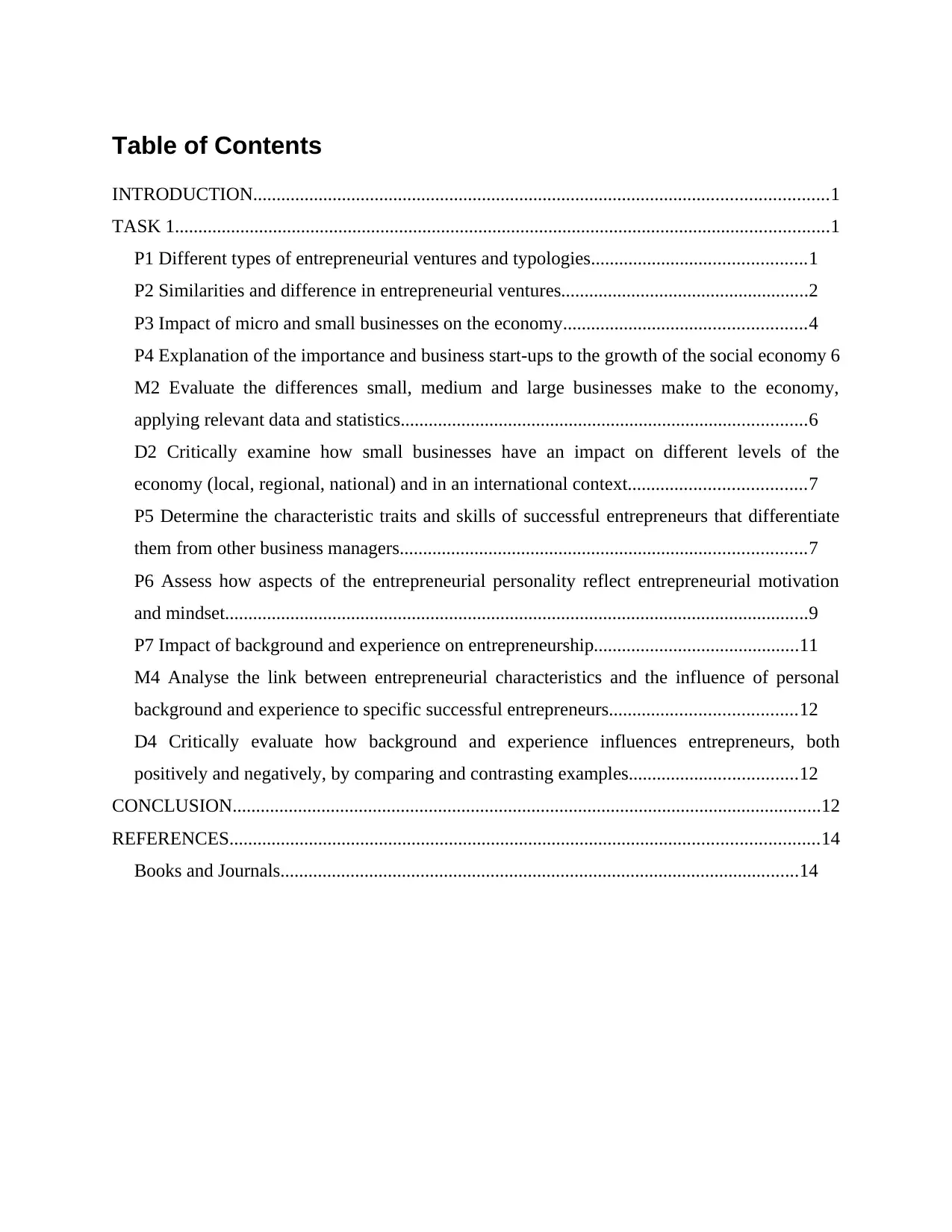
Table of Contents
INTRODUCTION...........................................................................................................................1
TASK 1............................................................................................................................................1
P1 Different types of entrepreneurial ventures and typologies..............................................1
P2 Similarities and difference in entrepreneurial ventures.....................................................2
P3 Impact of micro and small businesses on the economy....................................................4
P4 Explanation of the importance and business start-ups to the growth of the social economy 6
M2 Evaluate the differences small, medium and large businesses make to the economy,
applying relevant data and statistics.......................................................................................6
D2 Critically examine how small businesses have an impact on different levels of the
economy (local, regional, national) and in an international context......................................7
P5 Determine the characteristic traits and skills of successful entrepreneurs that differentiate
them from other business managers.......................................................................................7
P6 Assess how aspects of the entrepreneurial personality reflect entrepreneurial motivation
and mindset.............................................................................................................................9
P7 Impact of background and experience on entrepreneurship............................................11
M4 Analyse the link between entrepreneurial characteristics and the influence of personal
background and experience to specific successful entrepreneurs........................................12
D4 Critically evaluate how background and experience influences entrepreneurs, both
positively and negatively, by comparing and contrasting examples....................................12
CONCLUSION..............................................................................................................................12
REFERENCES..............................................................................................................................14
Books and Journals...............................................................................................................14
INTRODUCTION...........................................................................................................................1
TASK 1............................................................................................................................................1
P1 Different types of entrepreneurial ventures and typologies..............................................1
P2 Similarities and difference in entrepreneurial ventures.....................................................2
P3 Impact of micro and small businesses on the economy....................................................4
P4 Explanation of the importance and business start-ups to the growth of the social economy 6
M2 Evaluate the differences small, medium and large businesses make to the economy,
applying relevant data and statistics.......................................................................................6
D2 Critically examine how small businesses have an impact on different levels of the
economy (local, regional, national) and in an international context......................................7
P5 Determine the characteristic traits and skills of successful entrepreneurs that differentiate
them from other business managers.......................................................................................7
P6 Assess how aspects of the entrepreneurial personality reflect entrepreneurial motivation
and mindset.............................................................................................................................9
P7 Impact of background and experience on entrepreneurship............................................11
M4 Analyse the link between entrepreneurial characteristics and the influence of personal
background and experience to specific successful entrepreneurs........................................12
D4 Critically evaluate how background and experience influences entrepreneurs, both
positively and negatively, by comparing and contrasting examples....................................12
CONCLUSION..............................................................................................................................12
REFERENCES..............................................................................................................................14
Books and Journals...............................................................................................................14
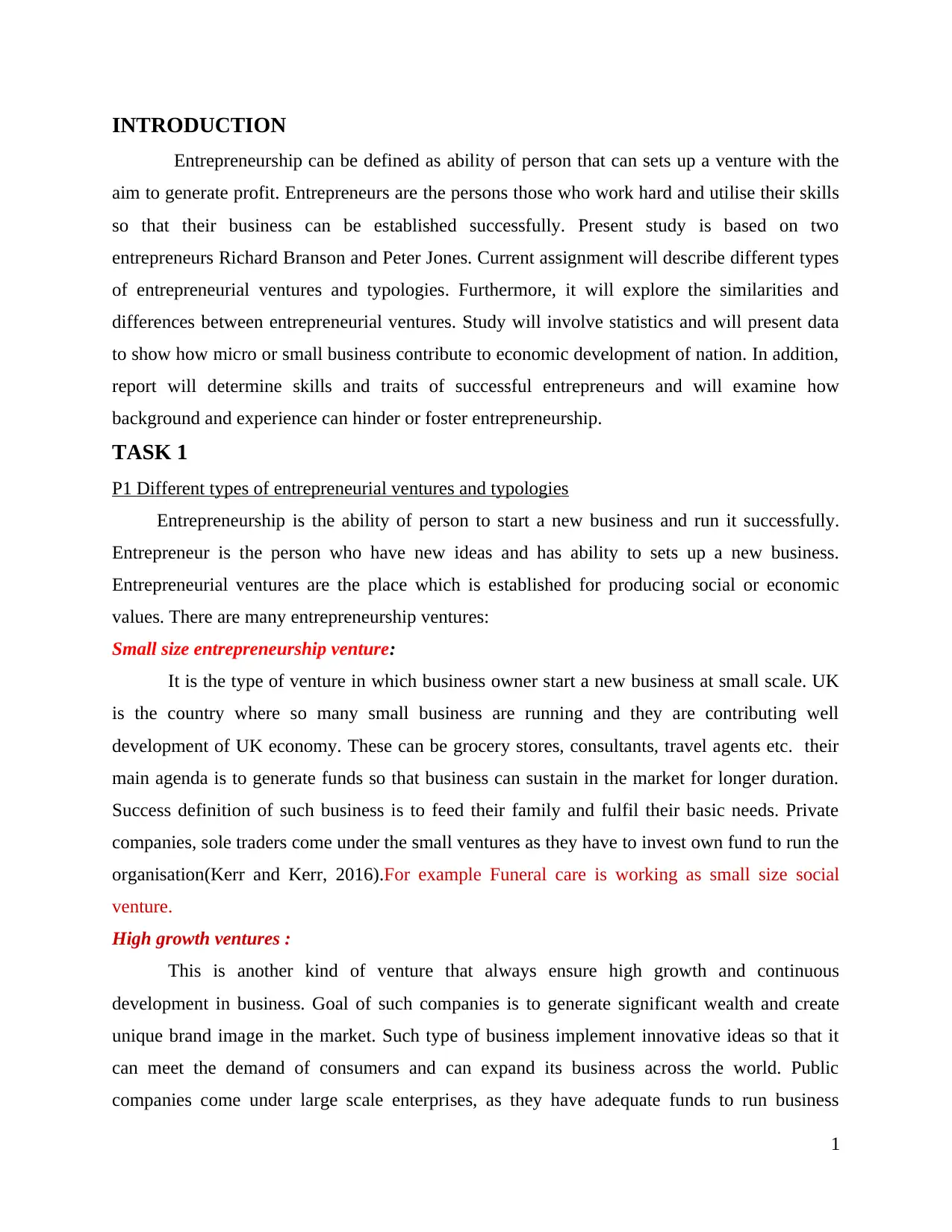
INTRODUCTION
Entrepreneurship can be defined as ability of person that can sets up a venture with the
aim to generate profit. Entrepreneurs are the persons those who work hard and utilise their skills
so that their business can be established successfully. Present study is based on two
entrepreneurs Richard Branson and Peter Jones. Current assignment will describe different types
of entrepreneurial ventures and typologies. Furthermore, it will explore the similarities and
differences between entrepreneurial ventures. Study will involve statistics and will present data
to show how micro or small business contribute to economic development of nation. In addition,
report will determine skills and traits of successful entrepreneurs and will examine how
background and experience can hinder or foster entrepreneurship.
TASK 1
P1 Different types of entrepreneurial ventures and typologies
Entrepreneurship is the ability of person to start a new business and run it successfully.
Entrepreneur is the person who have new ideas and has ability to sets up a new business.
Entrepreneurial ventures are the place which is established for producing social or economic
values. There are many entrepreneurship ventures:
Small size entrepreneurship venture:
It is the type of venture in which business owner start a new business at small scale. UK
is the country where so many small business are running and they are contributing well
development of UK economy. These can be grocery stores, consultants, travel agents etc. their
main agenda is to generate funds so that business can sustain in the market for longer duration.
Success definition of such business is to feed their family and fulfil their basic needs. Private
companies, sole traders come under the small ventures as they have to invest own fund to run the
organisation(Kerr and Kerr, 2016).For example Funeral care is working as small size social
venture.
High growth ventures :
This is another kind of venture that always ensure high growth and continuous
development in business. Goal of such companies is to generate significant wealth and create
unique brand image in the market. Such type of business implement innovative ideas so that it
can meet the demand of consumers and can expand its business across the world. Public
companies come under large scale enterprises, as they have adequate funds to run business
1
Entrepreneurship can be defined as ability of person that can sets up a venture with the
aim to generate profit. Entrepreneurs are the persons those who work hard and utilise their skills
so that their business can be established successfully. Present study is based on two
entrepreneurs Richard Branson and Peter Jones. Current assignment will describe different types
of entrepreneurial ventures and typologies. Furthermore, it will explore the similarities and
differences between entrepreneurial ventures. Study will involve statistics and will present data
to show how micro or small business contribute to economic development of nation. In addition,
report will determine skills and traits of successful entrepreneurs and will examine how
background and experience can hinder or foster entrepreneurship.
TASK 1
P1 Different types of entrepreneurial ventures and typologies
Entrepreneurship is the ability of person to start a new business and run it successfully.
Entrepreneur is the person who have new ideas and has ability to sets up a new business.
Entrepreneurial ventures are the place which is established for producing social or economic
values. There are many entrepreneurship ventures:
Small size entrepreneurship venture:
It is the type of venture in which business owner start a new business at small scale. UK
is the country where so many small business are running and they are contributing well
development of UK economy. These can be grocery stores, consultants, travel agents etc. their
main agenda is to generate funds so that business can sustain in the market for longer duration.
Success definition of such business is to feed their family and fulfil their basic needs. Private
companies, sole traders come under the small ventures as they have to invest own fund to run the
organisation(Kerr and Kerr, 2016).For example Funeral care is working as small size social
venture.
High growth ventures :
This is another kind of venture that always ensure high growth and continuous
development in business. Goal of such companies is to generate significant wealth and create
unique brand image in the market. Such type of business implement innovative ideas so that it
can meet the demand of consumers and can expand its business across the world. Public
companies come under large scale enterprises, as they have adequate funds to run business
1
⊘ This is a preview!⊘
Do you want full access?
Subscribe today to unlock all pages.

Trusted by 1+ million students worldwide
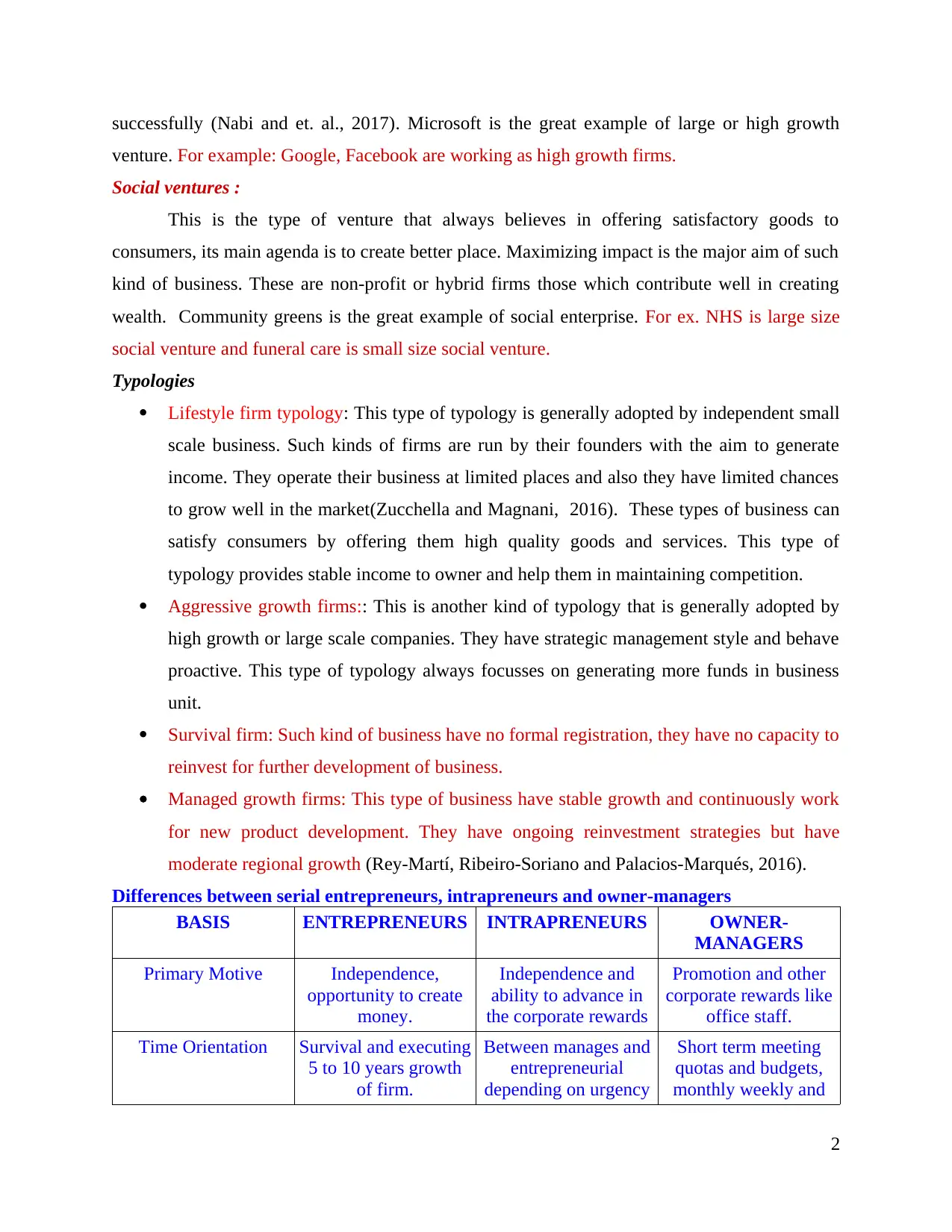
successfully (Nabi and et. al., 2017). Microsoft is the great example of large or high growth
venture. For example: Google, Facebook are working as high growth firms.
Social ventures :
This is the type of venture that always believes in offering satisfactory goods to
consumers, its main agenda is to create better place. Maximizing impact is the major aim of such
kind of business. These are non-profit or hybrid firms those which contribute well in creating
wealth. Community greens is the great example of social enterprise. For ex. NHS is large size
social venture and funeral care is small size social venture.
Typologies
Lifestyle firm typology: This type of typology is generally adopted by independent small
scale business. Such kinds of firms are run by their founders with the aim to generate
income. They operate their business at limited places and also they have limited chances
to grow well in the market(Zucchella and Magnani, 2016). These types of business can
satisfy consumers by offering them high quality goods and services. This type of
typology provides stable income to owner and help them in maintaining competition.
Aggressive growth firms:: This is another kind of typology that is generally adopted by
high growth or large scale companies. They have strategic management style and behave
proactive. This type of typology always focusses on generating more funds in business
unit.
Survival firm: Such kind of business have no formal registration, they have no capacity to
reinvest for further development of business.
Managed growth firms: This type of business have stable growth and continuously work
for new product development. They have ongoing reinvestment strategies but have
moderate regional growth (Rey-Martí, Ribeiro-Soriano and Palacios-Marqués, 2016).
Differences between serial entrepreneurs, intrapreneurs and owner-managers
BASIS ENTREPRENEURS INTRAPRENEURS OWNER-
MANAGERS
Primary Motive Independence,
opportunity to create
money.
Independence and
ability to advance in
the corporate rewards
Promotion and other
corporate rewards like
office staff.
Time Orientation Survival and executing
5 to 10 years growth
of firm.
Between manages and
entrepreneurial
depending on urgency
Short term meeting
quotas and budgets,
monthly weekly and
2
venture. For example: Google, Facebook are working as high growth firms.
Social ventures :
This is the type of venture that always believes in offering satisfactory goods to
consumers, its main agenda is to create better place. Maximizing impact is the major aim of such
kind of business. These are non-profit or hybrid firms those which contribute well in creating
wealth. Community greens is the great example of social enterprise. For ex. NHS is large size
social venture and funeral care is small size social venture.
Typologies
Lifestyle firm typology: This type of typology is generally adopted by independent small
scale business. Such kinds of firms are run by their founders with the aim to generate
income. They operate their business at limited places and also they have limited chances
to grow well in the market(Zucchella and Magnani, 2016). These types of business can
satisfy consumers by offering them high quality goods and services. This type of
typology provides stable income to owner and help them in maintaining competition.
Aggressive growth firms:: This is another kind of typology that is generally adopted by
high growth or large scale companies. They have strategic management style and behave
proactive. This type of typology always focusses on generating more funds in business
unit.
Survival firm: Such kind of business have no formal registration, they have no capacity to
reinvest for further development of business.
Managed growth firms: This type of business have stable growth and continuously work
for new product development. They have ongoing reinvestment strategies but have
moderate regional growth (Rey-Martí, Ribeiro-Soriano and Palacios-Marqués, 2016).
Differences between serial entrepreneurs, intrapreneurs and owner-managers
BASIS ENTREPRENEURS INTRAPRENEURS OWNER-
MANAGERS
Primary Motive Independence,
opportunity to create
money.
Independence and
ability to advance in
the corporate rewards
Promotion and other
corporate rewards like
office staff.
Time Orientation Survival and executing
5 to 10 years growth
of firm.
Between manages and
entrepreneurial
depending on urgency
Short term meeting
quotas and budgets,
monthly weekly and
2
Paraphrase This Document
Need a fresh take? Get an instant paraphrase of this document with our AI Paraphraser
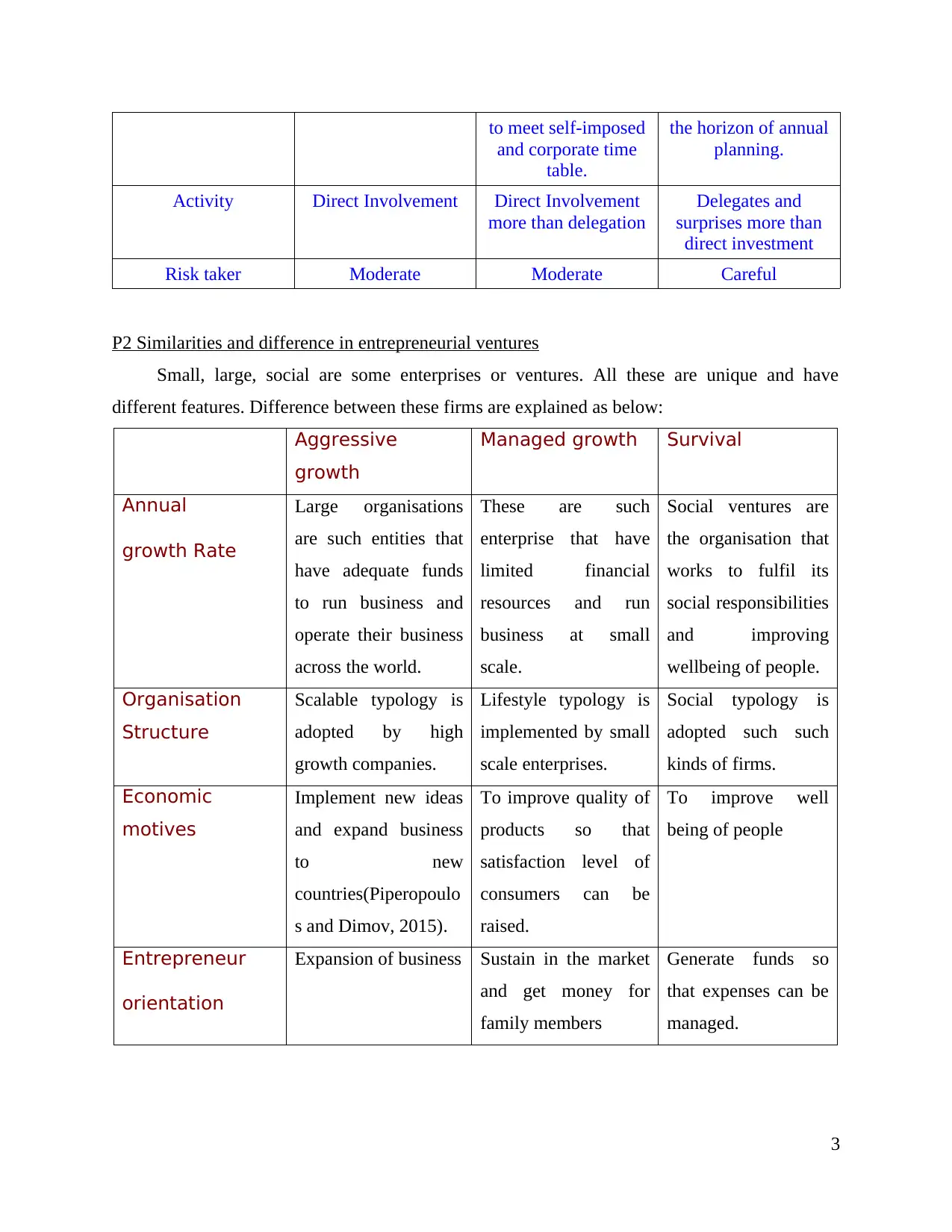
to meet self-imposed
and corporate time
table.
the horizon of annual
planning.
Activity Direct Involvement Direct Involvement
more than delegation
Delegates and
surprises more than
direct investment
Risk taker Moderate Moderate Careful
P2 Similarities and difference in entrepreneurial ventures
Small, large, social are some enterprises or ventures. All these are unique and have
different features. Difference between these firms are explained as below:
Aggressive
growth
Managed growth Survival
Annual
growth Rate
Large organisations
are such entities that
have adequate funds
to run business and
operate their business
across the world.
These are such
enterprise that have
limited financial
resources and run
business at small
scale.
Social ventures are
the organisation that
works to fulfil its
social responsibilities
and improving
wellbeing of people.
Organisation
Structure
Scalable typology is
adopted by high
growth companies.
Lifestyle typology is
implemented by small
scale enterprises.
Social typology is
adopted such such
kinds of firms.
Economic
motives
Implement new ideas
and expand business
to new
countries(Piperopoulo
s and Dimov, 2015).
To improve quality of
products so that
satisfaction level of
consumers can be
raised.
To improve well
being of people
Entrepreneur
orientation
Expansion of business Sustain in the market
and get money for
family members
Generate funds so
that expenses can be
managed.
3
and corporate time
table.
the horizon of annual
planning.
Activity Direct Involvement Direct Involvement
more than delegation
Delegates and
surprises more than
direct investment
Risk taker Moderate Moderate Careful
P2 Similarities and difference in entrepreneurial ventures
Small, large, social are some enterprises or ventures. All these are unique and have
different features. Difference between these firms are explained as below:
Aggressive
growth
Managed growth Survival
Annual
growth Rate
Large organisations
are such entities that
have adequate funds
to run business and
operate their business
across the world.
These are such
enterprise that have
limited financial
resources and run
business at small
scale.
Social ventures are
the organisation that
works to fulfil its
social responsibilities
and improving
wellbeing of people.
Organisation
Structure
Scalable typology is
adopted by high
growth companies.
Lifestyle typology is
implemented by small
scale enterprises.
Social typology is
adopted such such
kinds of firms.
Economic
motives
Implement new ideas
and expand business
to new
countries(Piperopoulo
s and Dimov, 2015).
To improve quality of
products so that
satisfaction level of
consumers can be
raised.
To improve well
being of people
Entrepreneur
orientation
Expansion of business Sustain in the market
and get money for
family members
Generate funds so
that expenses can be
managed.
3
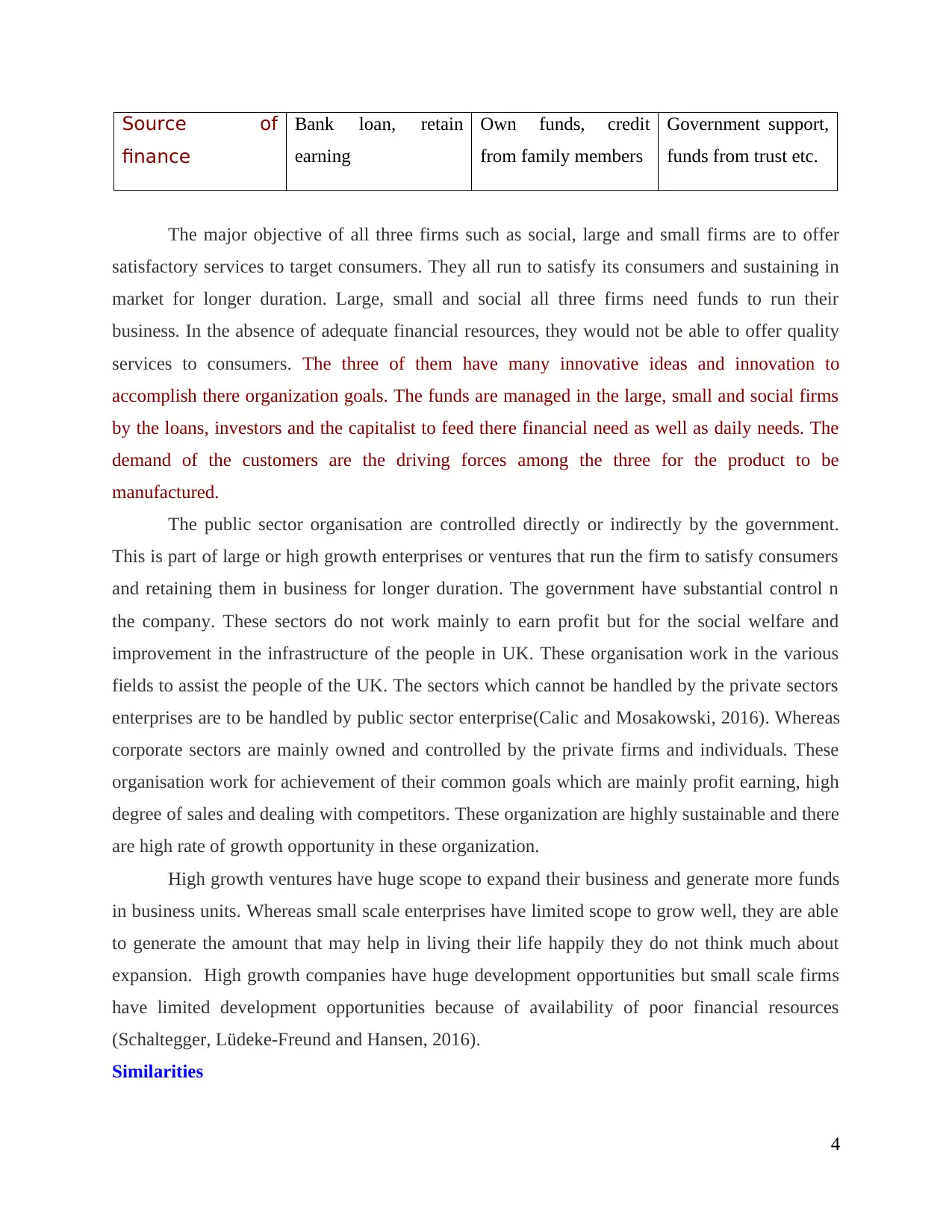
Source of
finance
Bank loan, retain
earning
Own funds, credit
from family members
Government support,
funds from trust etc.
The major objective of all three firms such as social, large and small firms are to offer
satisfactory services to target consumers. They all run to satisfy its consumers and sustaining in
market for longer duration. Large, small and social all three firms need funds to run their
business. In the absence of adequate financial resources, they would not be able to offer quality
services to consumers. The three of them have many innovative ideas and innovation to
accomplish there organization goals. The funds are managed in the large, small and social firms
by the loans, investors and the capitalist to feed there financial need as well as daily needs. The
demand of the customers are the driving forces among the three for the product to be
manufactured.
The public sector organisation are controlled directly or indirectly by the government.
This is part of large or high growth enterprises or ventures that run the firm to satisfy consumers
and retaining them in business for longer duration. The government have substantial control n
the company. These sectors do not work mainly to earn profit but for the social welfare and
improvement in the infrastructure of the people in UK. These organisation work in the various
fields to assist the people of the UK. The sectors which cannot be handled by the private sectors
enterprises are to be handled by public sector enterprise(Calic and Mosakowski, 2016). Whereas
corporate sectors are mainly owned and controlled by the private firms and individuals. These
organisation work for achievement of their common goals which are mainly profit earning, high
degree of sales and dealing with competitors. These organization are highly sustainable and there
are high rate of growth opportunity in these organization.
High growth ventures have huge scope to expand their business and generate more funds
in business units. Whereas small scale enterprises have limited scope to grow well, they are able
to generate the amount that may help in living their life happily they do not think much about
expansion. High growth companies have huge development opportunities but small scale firms
have limited development opportunities because of availability of poor financial resources
(Schaltegger, Lüdeke-Freund and Hansen, 2016).
Similarities
4
finance
Bank loan, retain
earning
Own funds, credit
from family members
Government support,
funds from trust etc.
The major objective of all three firms such as social, large and small firms are to offer
satisfactory services to target consumers. They all run to satisfy its consumers and sustaining in
market for longer duration. Large, small and social all three firms need funds to run their
business. In the absence of adequate financial resources, they would not be able to offer quality
services to consumers. The three of them have many innovative ideas and innovation to
accomplish there organization goals. The funds are managed in the large, small and social firms
by the loans, investors and the capitalist to feed there financial need as well as daily needs. The
demand of the customers are the driving forces among the three for the product to be
manufactured.
The public sector organisation are controlled directly or indirectly by the government.
This is part of large or high growth enterprises or ventures that run the firm to satisfy consumers
and retaining them in business for longer duration. The government have substantial control n
the company. These sectors do not work mainly to earn profit but for the social welfare and
improvement in the infrastructure of the people in UK. These organisation work in the various
fields to assist the people of the UK. The sectors which cannot be handled by the private sectors
enterprises are to be handled by public sector enterprise(Calic and Mosakowski, 2016). Whereas
corporate sectors are mainly owned and controlled by the private firms and individuals. These
organisation work for achievement of their common goals which are mainly profit earning, high
degree of sales and dealing with competitors. These organization are highly sustainable and there
are high rate of growth opportunity in these organization.
High growth ventures have huge scope to expand their business and generate more funds
in business units. Whereas small scale enterprises have limited scope to grow well, they are able
to generate the amount that may help in living their life happily they do not think much about
expansion. High growth companies have huge development opportunities but small scale firms
have limited development opportunities because of availability of poor financial resources
(Schaltegger, Lüdeke-Freund and Hansen, 2016).
Similarities
4
⊘ This is a preview!⊘
Do you want full access?
Subscribe today to unlock all pages.

Trusted by 1+ million students worldwide
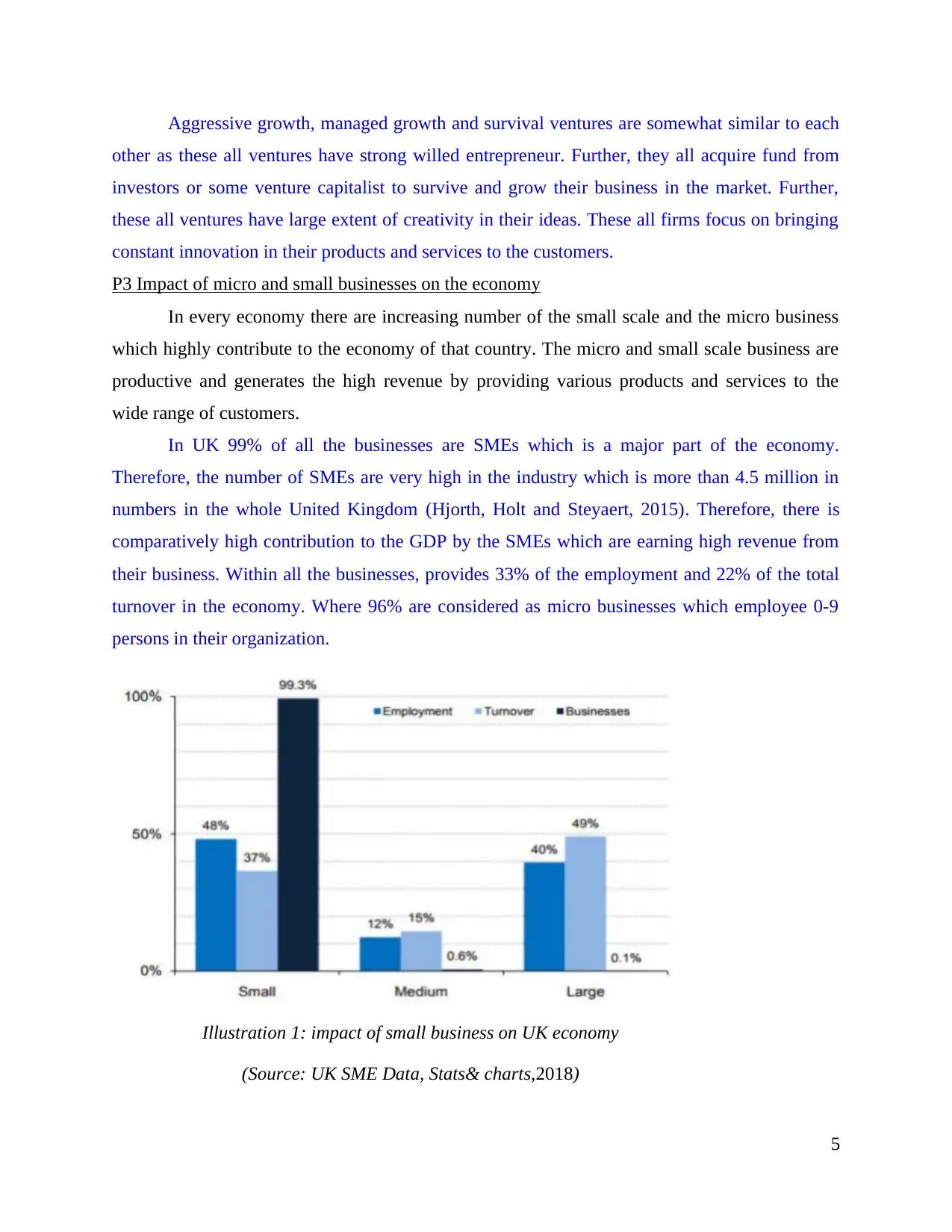
Aggressive growth, managed growth and survival ventures are somewhat similar to each
other as these all ventures have strong willed entrepreneur. Further, they all acquire fund from
investors or some venture capitalist to survive and grow their business in the market. Further,
these all ventures have large extent of creativity in their ideas. These all firms focus on bringing
constant innovation in their products and services to the customers.
P3 Impact of micro and small businesses on the economy
In every economy there are increasing number of the small scale and the micro business
which highly contribute to the economy of that country. The micro and small scale business are
productive and generates the high revenue by providing various products and services to the
wide range of customers.
In UK 99% of all the businesses are SMEs which is a major part of the economy.
Therefore, the number of SMEs are very high in the industry which is more than 4.5 million in
numbers in the whole United Kingdom (Hjorth, Holt and Steyaert, 2015). Therefore, there is
comparatively high contribution to the GDP by the SMEs which are earning high revenue from
their business. Within all the businesses, provides 33% of the employment and 22% of the total
turnover in the economy. Where 96% are considered as micro businesses which employee 0-9
persons in their organization.
Illustration 1: impact of small business on UK economy
(Source: UK SME Data, Stats& charts,2018)
5
other as these all ventures have strong willed entrepreneur. Further, they all acquire fund from
investors or some venture capitalist to survive and grow their business in the market. Further,
these all ventures have large extent of creativity in their ideas. These all firms focus on bringing
constant innovation in their products and services to the customers.
P3 Impact of micro and small businesses on the economy
In every economy there are increasing number of the small scale and the micro business
which highly contribute to the economy of that country. The micro and small scale business are
productive and generates the high revenue by providing various products and services to the
wide range of customers.
In UK 99% of all the businesses are SMEs which is a major part of the economy.
Therefore, the number of SMEs are very high in the industry which is more than 4.5 million in
numbers in the whole United Kingdom (Hjorth, Holt and Steyaert, 2015). Therefore, there is
comparatively high contribution to the GDP by the SMEs which are earning high revenue from
their business. Within all the businesses, provides 33% of the employment and 22% of the total
turnover in the economy. Where 96% are considered as micro businesses which employee 0-9
persons in their organization.
Illustration 1: impact of small business on UK economy
(Source: UK SME Data, Stats& charts,2018)
5
Paraphrase This Document
Need a fresh take? Get an instant paraphrase of this document with our AI Paraphraser
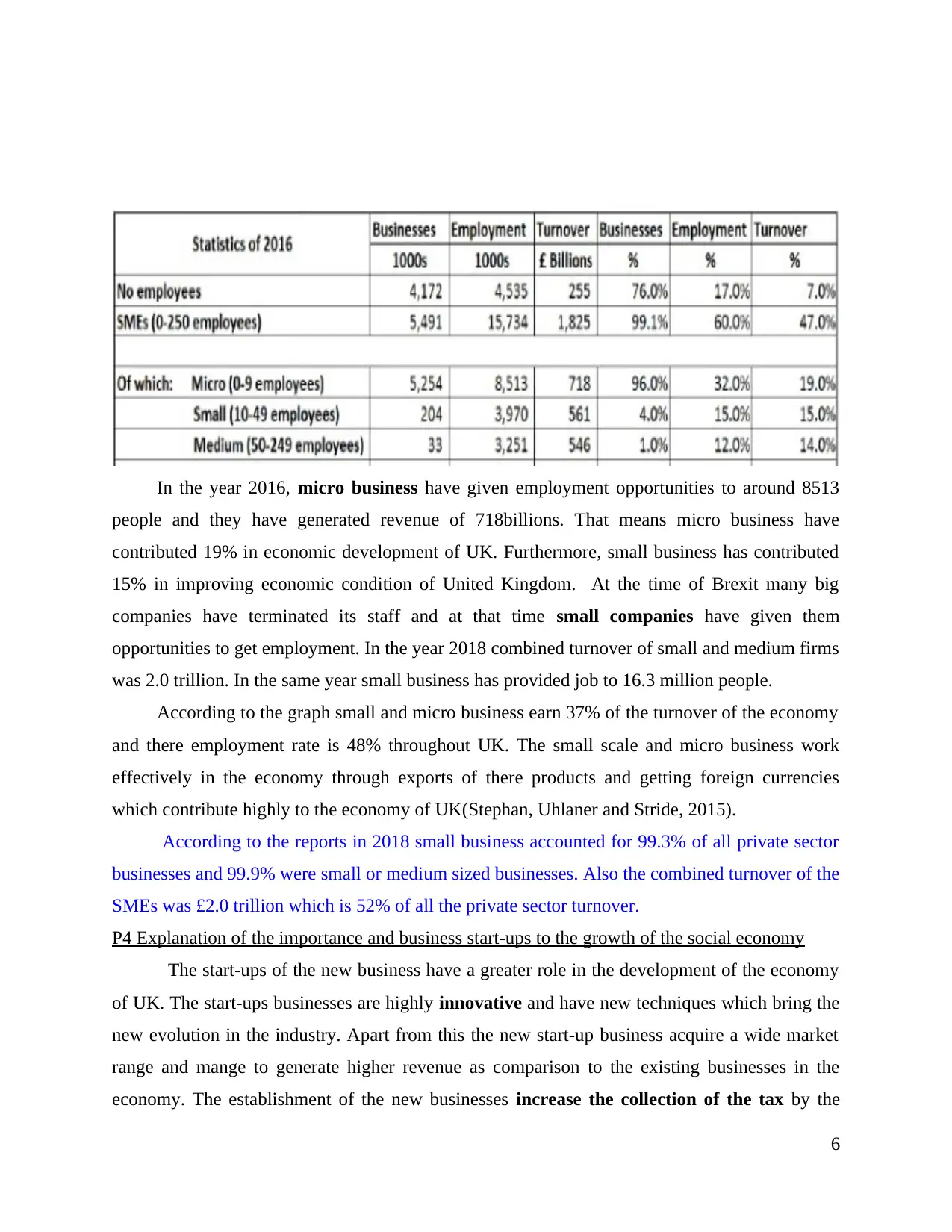
In the year 2016, micro business have given employment opportunities to around 8513
people and they have generated revenue of 718billions. That means micro business have
contributed 19% in economic development of UK. Furthermore, small business has contributed
15% in improving economic condition of United Kingdom. At the time of Brexit many big
companies have terminated its staff and at that time small companies have given them
opportunities to get employment. In the year 2018 combined turnover of small and medium firms
was 2.0 trillion. In the same year small business has provided job to 16.3 million people.
According to the graph small and micro business earn 37% of the turnover of the economy
and there employment rate is 48% throughout UK. The small scale and micro business work
effectively in the economy through exports of there products and getting foreign currencies
which contribute highly to the economy of UK(Stephan, Uhlaner and Stride, 2015).
According to the reports in 2018 small business accounted for 99.3% of all private sector
businesses and 99.9% were small or medium sized businesses. Also the combined turnover of the
SMEs was £2.0 trillion which is 52% of all the private sector turnover.
P4 Explanation of the importance and business start-ups to the growth of the social economy
The start-ups of the new business have a greater role in the development of the economy
of UK. The start-ups businesses are highly innovative and have new techniques which bring the
new evolution in the industry. Apart from this the new start-up business acquire a wide market
range and mange to generate higher revenue as comparison to the existing businesses in the
economy. The establishment of the new businesses increase the collection of the tax by the
6
people and they have generated revenue of 718billions. That means micro business have
contributed 19% in economic development of UK. Furthermore, small business has contributed
15% in improving economic condition of United Kingdom. At the time of Brexit many big
companies have terminated its staff and at that time small companies have given them
opportunities to get employment. In the year 2018 combined turnover of small and medium firms
was 2.0 trillion. In the same year small business has provided job to 16.3 million people.
According to the graph small and micro business earn 37% of the turnover of the economy
and there employment rate is 48% throughout UK. The small scale and micro business work
effectively in the economy through exports of there products and getting foreign currencies
which contribute highly to the economy of UK(Stephan, Uhlaner and Stride, 2015).
According to the reports in 2018 small business accounted for 99.3% of all private sector
businesses and 99.9% were small or medium sized businesses. Also the combined turnover of the
SMEs was £2.0 trillion which is 52% of all the private sector turnover.
P4 Explanation of the importance and business start-ups to the growth of the social economy
The start-ups of the new business have a greater role in the development of the economy
of UK. The start-ups businesses are highly innovative and have new techniques which bring the
new evolution in the industry. Apart from this the new start-up business acquire a wide market
range and mange to generate higher revenue as comparison to the existing businesses in the
economy. The establishment of the new businesses increase the collection of the tax by the
6
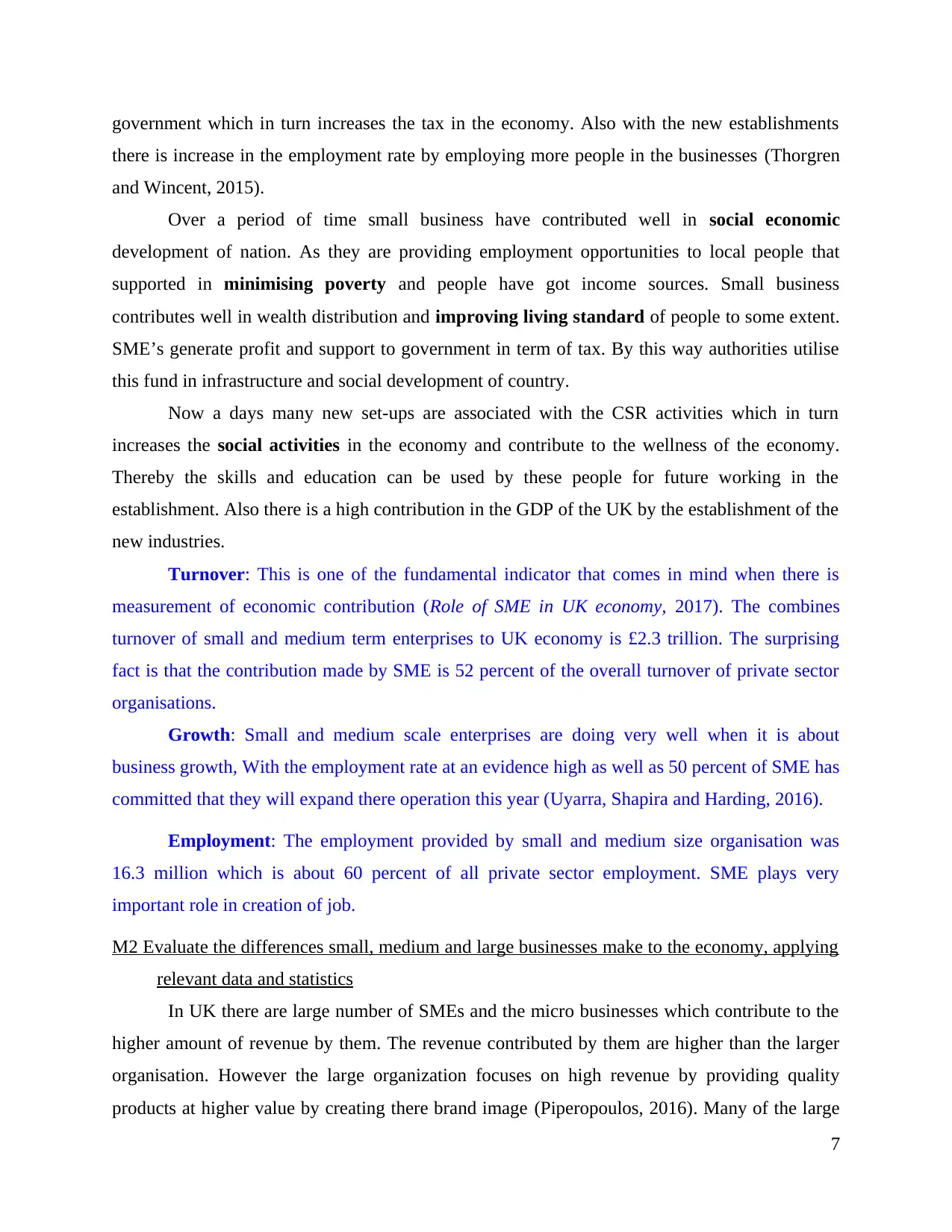
government which in turn increases the tax in the economy. Also with the new establishments
there is increase in the employment rate by employing more people in the businesses (Thorgren
and Wincent, 2015).
Over a period of time small business have contributed well in social economic
development of nation. As they are providing employment opportunities to local people that
supported in minimising poverty and people have got income sources. Small business
contributes well in wealth distribution and improving living standard of people to some extent.
SME’s generate profit and support to government in term of tax. By this way authorities utilise
this fund in infrastructure and social development of country.
Now a days many new set-ups are associated with the CSR activities which in turn
increases the social activities in the economy and contribute to the wellness of the economy.
Thereby the skills and education can be used by these people for future working in the
establishment. Also there is a high contribution in the GDP of the UK by the establishment of the
new industries.
Turnover: This is one of the fundamental indicator that comes in mind when there is
measurement of economic contribution (Role of SME in UK economy, 2017). The combines
turnover of small and medium term enterprises to UK economy is £2.3 trillion. The surprising
fact is that the contribution made by SME is 52 percent of the overall turnover of private sector
organisations.
Growth: Small and medium scale enterprises are doing very well when it is about
business growth, With the employment rate at an evidence high as well as 50 percent of SME has
committed that they will expand there operation this year (Uyarra, Shapira and Harding, 2016).
Employment: The employment provided by small and medium size organisation was
16.3 million which is about 60 percent of all private sector employment. SME plays very
important role in creation of job.
M2 Evaluate the differences small, medium and large businesses make to the economy, applying
relevant data and statistics
In UK there are large number of SMEs and the micro businesses which contribute to the
higher amount of revenue by them. The revenue contributed by them are higher than the larger
organisation. However the large organization focuses on high revenue by providing quality
products at higher value by creating there brand image (Piperopoulos, 2016). Many of the large
7
there is increase in the employment rate by employing more people in the businesses (Thorgren
and Wincent, 2015).
Over a period of time small business have contributed well in social economic
development of nation. As they are providing employment opportunities to local people that
supported in minimising poverty and people have got income sources. Small business
contributes well in wealth distribution and improving living standard of people to some extent.
SME’s generate profit and support to government in term of tax. By this way authorities utilise
this fund in infrastructure and social development of country.
Now a days many new set-ups are associated with the CSR activities which in turn
increases the social activities in the economy and contribute to the wellness of the economy.
Thereby the skills and education can be used by these people for future working in the
establishment. Also there is a high contribution in the GDP of the UK by the establishment of the
new industries.
Turnover: This is one of the fundamental indicator that comes in mind when there is
measurement of economic contribution (Role of SME in UK economy, 2017). The combines
turnover of small and medium term enterprises to UK economy is £2.3 trillion. The surprising
fact is that the contribution made by SME is 52 percent of the overall turnover of private sector
organisations.
Growth: Small and medium scale enterprises are doing very well when it is about
business growth, With the employment rate at an evidence high as well as 50 percent of SME has
committed that they will expand there operation this year (Uyarra, Shapira and Harding, 2016).
Employment: The employment provided by small and medium size organisation was
16.3 million which is about 60 percent of all private sector employment. SME plays very
important role in creation of job.
M2 Evaluate the differences small, medium and large businesses make to the economy, applying
relevant data and statistics
In UK there are large number of SMEs and the micro businesses which contribute to the
higher amount of revenue by them. The revenue contributed by them are higher than the larger
organisation. However the large organization focuses on high revenue by providing quality
products at higher value by creating there brand image (Piperopoulos, 2016). Many of the large
7
⊘ This is a preview!⊘
Do you want full access?
Subscribe today to unlock all pages.

Trusted by 1+ million students worldwide
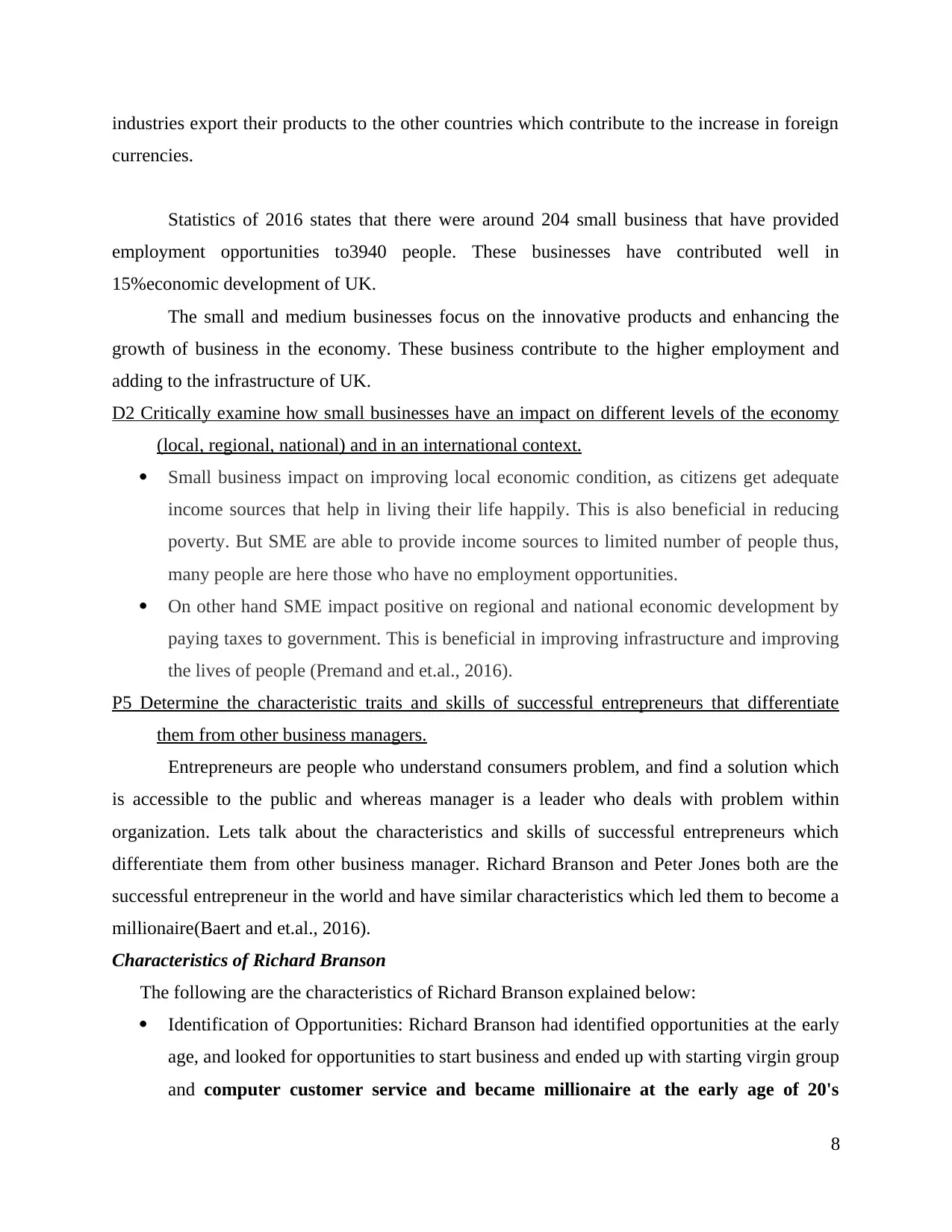
industries export their products to the other countries which contribute to the increase in foreign
currencies.
Statistics of 2016 states that there were around 204 small business that have provided
employment opportunities to3940 people. These businesses have contributed well in
15%economic development of UK.
The small and medium businesses focus on the innovative products and enhancing the
growth of business in the economy. These business contribute to the higher employment and
adding to the infrastructure of UK.
D2 Critically examine how small businesses have an impact on different levels of the economy
(local, regional, national) and in an international context.
Small business impact on improving local economic condition, as citizens get adequate
income sources that help in living their life happily. This is also beneficial in reducing
poverty. But SME are able to provide income sources to limited number of people thus,
many people are here those who have no employment opportunities.
On other hand SME impact positive on regional and national economic development by
paying taxes to government. This is beneficial in improving infrastructure and improving
the lives of people (Premand and et.al., 2016).
P5 Determine the characteristic traits and skills of successful entrepreneurs that differentiate
them from other business managers.
Entrepreneurs are people who understand consumers problem, and find a solution which
is accessible to the public and whereas manager is a leader who deals with problem within
organization. Lets talk about the characteristics and skills of successful entrepreneurs which
differentiate them from other business manager. Richard Branson and Peter Jones both are the
successful entrepreneur in the world and have similar characteristics which led them to become a
millionaire(Baert and et.al., 2016).
Characteristics of Richard Branson
The following are the characteristics of Richard Branson explained below:
Identification of Opportunities: Richard Branson had identified opportunities at the early
age, and looked for opportunities to start business and ended up with starting virgin group
and computer customer service and became millionaire at the early age of 20's
8
currencies.
Statistics of 2016 states that there were around 204 small business that have provided
employment opportunities to3940 people. These businesses have contributed well in
15%economic development of UK.
The small and medium businesses focus on the innovative products and enhancing the
growth of business in the economy. These business contribute to the higher employment and
adding to the infrastructure of UK.
D2 Critically examine how small businesses have an impact on different levels of the economy
(local, regional, national) and in an international context.
Small business impact on improving local economic condition, as citizens get adequate
income sources that help in living their life happily. This is also beneficial in reducing
poverty. But SME are able to provide income sources to limited number of people thus,
many people are here those who have no employment opportunities.
On other hand SME impact positive on regional and national economic development by
paying taxes to government. This is beneficial in improving infrastructure and improving
the lives of people (Premand and et.al., 2016).
P5 Determine the characteristic traits and skills of successful entrepreneurs that differentiate
them from other business managers.
Entrepreneurs are people who understand consumers problem, and find a solution which
is accessible to the public and whereas manager is a leader who deals with problem within
organization. Lets talk about the characteristics and skills of successful entrepreneurs which
differentiate them from other business manager. Richard Branson and Peter Jones both are the
successful entrepreneur in the world and have similar characteristics which led them to become a
millionaire(Baert and et.al., 2016).
Characteristics of Richard Branson
The following are the characteristics of Richard Branson explained below:
Identification of Opportunities: Richard Branson had identified opportunities at the early
age, and looked for opportunities to start business and ended up with starting virgin group
and computer customer service and became millionaire at the early age of 20's
8
Paraphrase This Document
Need a fresh take? Get an instant paraphrase of this document with our AI Paraphraser
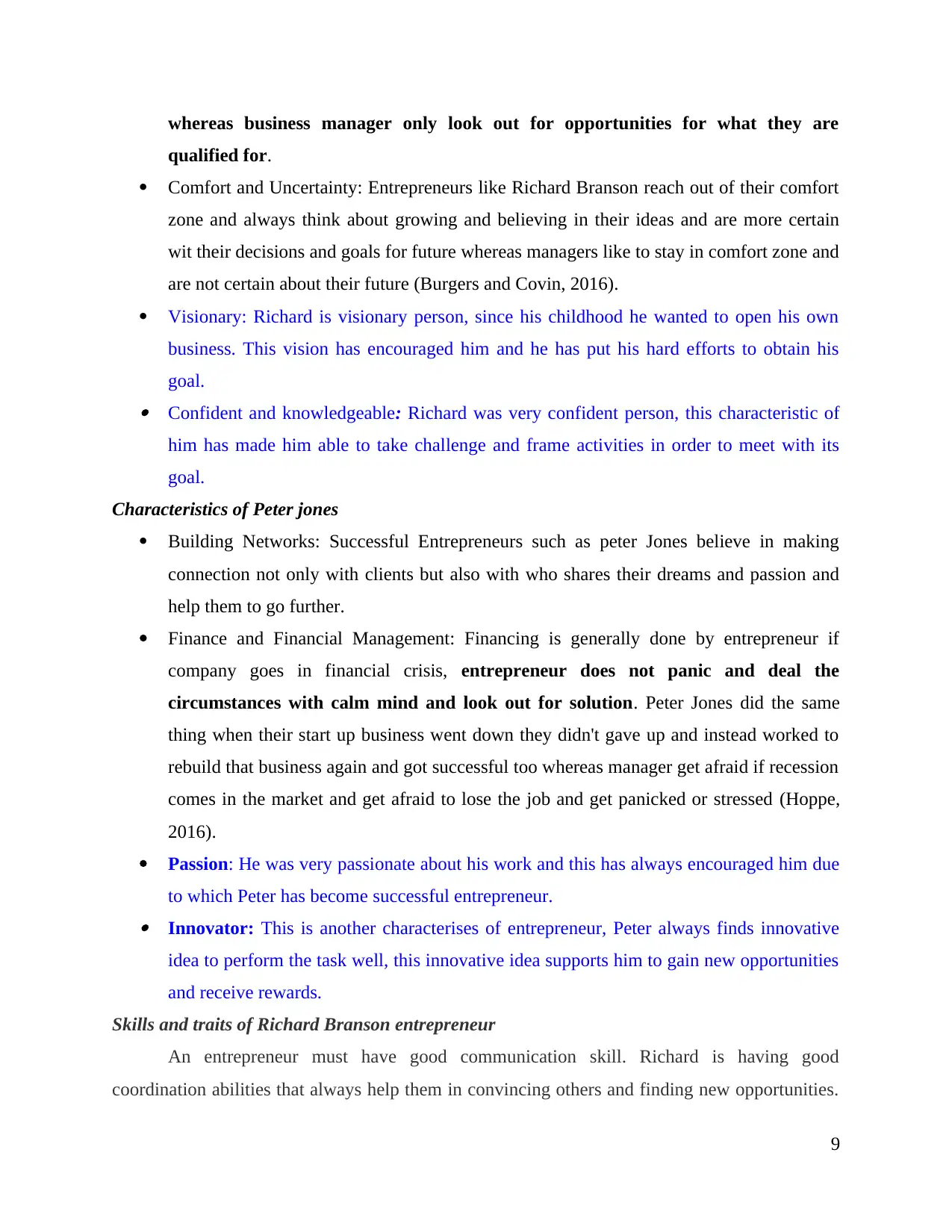
whereas business manager only look out for opportunities for what they are
qualified for.
Comfort and Uncertainty: Entrepreneurs like Richard Branson reach out of their comfort
zone and always think about growing and believing in their ideas and are more certain
wit their decisions and goals for future whereas managers like to stay in comfort zone and
are not certain about their future (Burgers and Covin, 2016).
Visionary: Richard is visionary person, since his childhood he wanted to open his own
business. This vision has encouraged him and he has put his hard efforts to obtain his
goal. Confident and knowledgeable: Richard was very confident person, this characteristic of
him has made him able to take challenge and frame activities in order to meet with its
goal.
Characteristics of Peter jones
Building Networks: Successful Entrepreneurs such as peter Jones believe in making
connection not only with clients but also with who shares their dreams and passion and
help them to go further.
Finance and Financial Management: Financing is generally done by entrepreneur if
company goes in financial crisis, entrepreneur does not panic and deal the
circumstances with calm mind and look out for solution. Peter Jones did the same
thing when their start up business went down they didn't gave up and instead worked to
rebuild that business again and got successful too whereas manager get afraid if recession
comes in the market and get afraid to lose the job and get panicked or stressed (Hoppe,
2016).
Passion: He was very passionate about his work and this has always encouraged him due
to which Peter has become successful entrepreneur. Innovator: This is another characterises of entrepreneur, Peter always finds innovative
idea to perform the task well, this innovative idea supports him to gain new opportunities
and receive rewards.
Skills and traits of Richard Branson entrepreneur
An entrepreneur must have good communication skill. Richard is having good
coordination abilities that always help them in convincing others and finding new opportunities.
9
qualified for.
Comfort and Uncertainty: Entrepreneurs like Richard Branson reach out of their comfort
zone and always think about growing and believing in their ideas and are more certain
wit their decisions and goals for future whereas managers like to stay in comfort zone and
are not certain about their future (Burgers and Covin, 2016).
Visionary: Richard is visionary person, since his childhood he wanted to open his own
business. This vision has encouraged him and he has put his hard efforts to obtain his
goal. Confident and knowledgeable: Richard was very confident person, this characteristic of
him has made him able to take challenge and frame activities in order to meet with its
goal.
Characteristics of Peter jones
Building Networks: Successful Entrepreneurs such as peter Jones believe in making
connection not only with clients but also with who shares their dreams and passion and
help them to go further.
Finance and Financial Management: Financing is generally done by entrepreneur if
company goes in financial crisis, entrepreneur does not panic and deal the
circumstances with calm mind and look out for solution. Peter Jones did the same
thing when their start up business went down they didn't gave up and instead worked to
rebuild that business again and got successful too whereas manager get afraid if recession
comes in the market and get afraid to lose the job and get panicked or stressed (Hoppe,
2016).
Passion: He was very passionate about his work and this has always encouraged him due
to which Peter has become successful entrepreneur. Innovator: This is another characterises of entrepreneur, Peter always finds innovative
idea to perform the task well, this innovative idea supports him to gain new opportunities
and receive rewards.
Skills and traits of Richard Branson entrepreneur
An entrepreneur must have good communication skill. Richard is having good
coordination abilities that always help them in convincing others and finding new opportunities.
9
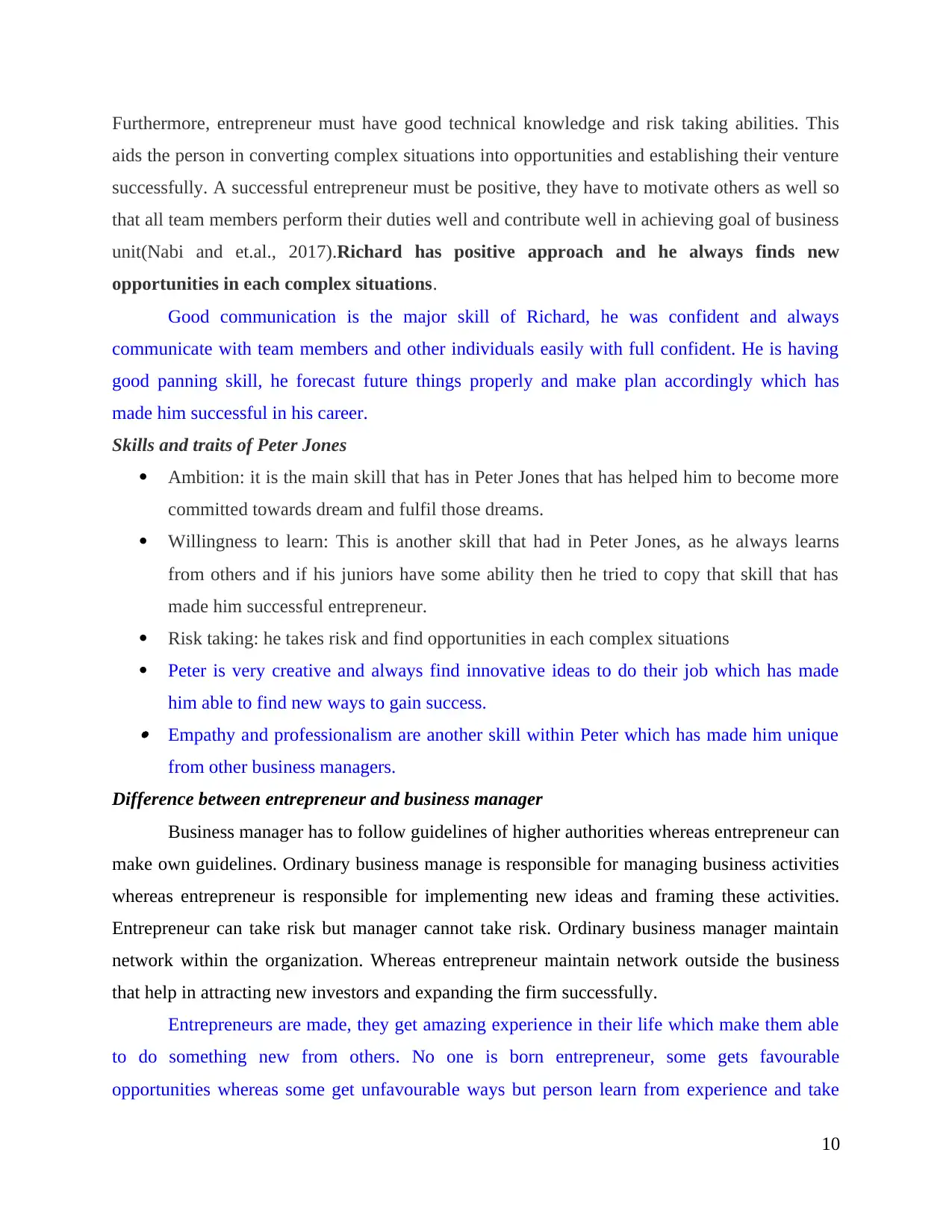
Furthermore, entrepreneur must have good technical knowledge and risk taking abilities. This
aids the person in converting complex situations into opportunities and establishing their venture
successfully. A successful entrepreneur must be positive, they have to motivate others as well so
that all team members perform their duties well and contribute well in achieving goal of business
unit(Nabi and et.al., 2017).Richard has positive approach and he always finds new
opportunities in each complex situations.
Good communication is the major skill of Richard, he was confident and always
communicate with team members and other individuals easily with full confident. He is having
good panning skill, he forecast future things properly and make plan accordingly which has
made him successful in his career.
Skills and traits of Peter Jones
Ambition: it is the main skill that has in Peter Jones that has helped him to become more
committed towards dream and fulfil those dreams.
Willingness to learn: This is another skill that had in Peter Jones, as he always learns
from others and if his juniors have some ability then he tried to copy that skill that has
made him successful entrepreneur.
Risk taking: he takes risk and find opportunities in each complex situations
Peter is very creative and always find innovative ideas to do their job which has made
him able to find new ways to gain success. Empathy and professionalism are another skill within Peter which has made him unique
from other business managers.
Difference between entrepreneur and business manager
Business manager has to follow guidelines of higher authorities whereas entrepreneur can
make own guidelines. Ordinary business manage is responsible for managing business activities
whereas entrepreneur is responsible for implementing new ideas and framing these activities.
Entrepreneur can take risk but manager cannot take risk. Ordinary business manager maintain
network within the organization. Whereas entrepreneur maintain network outside the business
that help in attracting new investors and expanding the firm successfully.
Entrepreneurs are made, they get amazing experience in their life which make them able
to do something new from others. No one is born entrepreneur, some gets favourable
opportunities whereas some get unfavourable ways but person learn from experience and take
10
aids the person in converting complex situations into opportunities and establishing their venture
successfully. A successful entrepreneur must be positive, they have to motivate others as well so
that all team members perform their duties well and contribute well in achieving goal of business
unit(Nabi and et.al., 2017).Richard has positive approach and he always finds new
opportunities in each complex situations.
Good communication is the major skill of Richard, he was confident and always
communicate with team members and other individuals easily with full confident. He is having
good panning skill, he forecast future things properly and make plan accordingly which has
made him successful in his career.
Skills and traits of Peter Jones
Ambition: it is the main skill that has in Peter Jones that has helped him to become more
committed towards dream and fulfil those dreams.
Willingness to learn: This is another skill that had in Peter Jones, as he always learns
from others and if his juniors have some ability then he tried to copy that skill that has
made him successful entrepreneur.
Risk taking: he takes risk and find opportunities in each complex situations
Peter is very creative and always find innovative ideas to do their job which has made
him able to find new ways to gain success. Empathy and professionalism are another skill within Peter which has made him unique
from other business managers.
Difference between entrepreneur and business manager
Business manager has to follow guidelines of higher authorities whereas entrepreneur can
make own guidelines. Ordinary business manage is responsible for managing business activities
whereas entrepreneur is responsible for implementing new ideas and framing these activities.
Entrepreneur can take risk but manager cannot take risk. Ordinary business manager maintain
network within the organization. Whereas entrepreneur maintain network outside the business
that help in attracting new investors and expanding the firm successfully.
Entrepreneurs are made, they get amazing experience in their life which make them able
to do something new from others. No one is born entrepreneur, some gets favourable
opportunities whereas some get unfavourable ways but person learn from experience and take
10
⊘ This is a preview!⊘
Do you want full access?
Subscribe today to unlock all pages.

Trusted by 1+ million students worldwide
1 out of 17
Related Documents
Your All-in-One AI-Powered Toolkit for Academic Success.
+13062052269
info@desklib.com
Available 24*7 on WhatsApp / Email
![[object Object]](/_next/static/media/star-bottom.7253800d.svg)
Unlock your academic potential
Copyright © 2020–2025 A2Z Services. All Rights Reserved. Developed and managed by ZUCOL.



